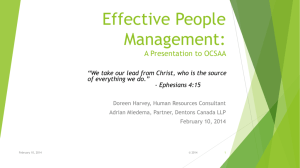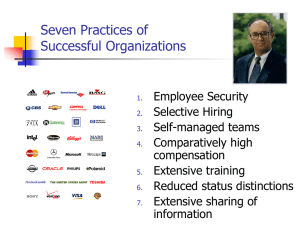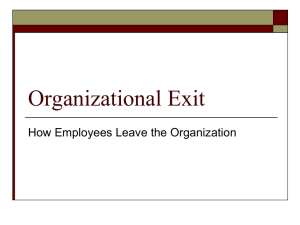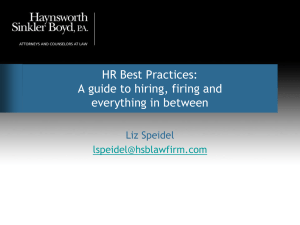Human Resources Management
advertisement
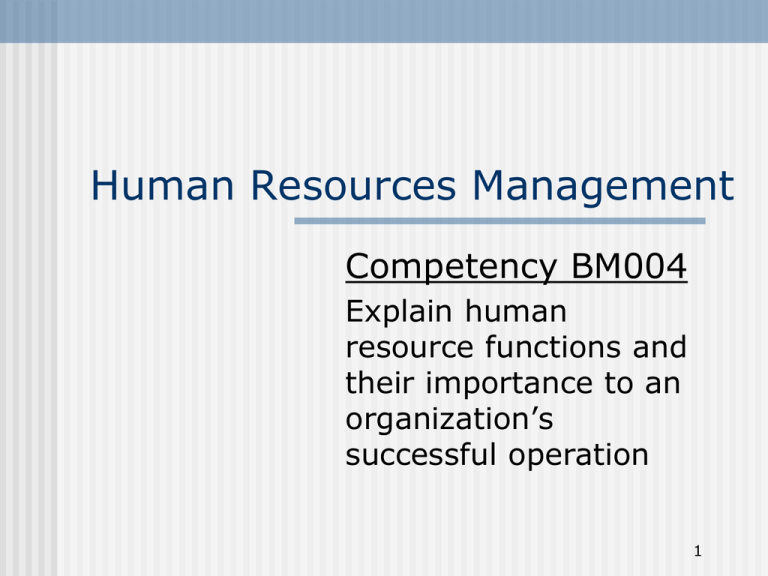
Human Resources Management Competency BM004 Explain human resource functions and their importance to an organization’s successful operation 1 Objective BM04.01 Evaluate recruitment sources and selection tools available to staff and organization. Identify needs of the company Examine methods of recruiting employees Outline the basics of hiring employees Outsourcing 2 Identify needs of the company Job Job Job Job Job Job Job analysis description – basic tasks specification – qualities needed design enlargement enrichment security 3 Why job descriptions? Employees know what is expected of them Employers know what they can expect Focus given to recruitment and selection process Justification for pay decisions, promotions, and disciplinary action Helpful to know before and after a company re-organization 4 Methods of Recruiting Employees Newspaper ads Headhunters Internet Employee referrals Flyers in college placement centers Job fairs Professional organizations Employment agencies Hidden market method Networking 5 The Basics of Hiring Employees Applications Resumes Interviews Advantages of hiring Internally Externally Other selection tools 6 The basics of . . . Applications Completion Good written communication skills Resumes Education Experience Achievements Skills Good written communication skills 7 The basics of interviews in hiring employees The purpose of the interview is to . . . Confirm information on application and/or resume Assess candidate on oral communications skills Gather information on human relations skills Provide information about the company and the job 8 Tips for Interviewer Greet applicant cordially Introduce yourself Seat him/her comfortably Establish rapport Limit your own talking Think like the applicant Don’t interrupt Concentrate Take notes Evaluate oral communications skills 9 Risky Interview Topics Ethnic/National origin Disabilities Family and family plans Previous workers’ compensation claims Work missed due to illness Off-the-job activities Age 10 Advantage of hiring . . . Internally: Less money spent on training (already knows company and its policies) Higher level of knowledge about company and its activities among employees Firsthand knowledge of employee performance Attractive addition for benefits package Good way to reward good employees Creates loyalty among employees 11 Advantages of hiring . . . Externally: Provides company with fresh, new ideas Competition from the outside keeps company employees performing at a high level Decreases internal back stabbing Provides a broader talent pool 12 Other Selection Tools Management assessment centers Aptitude tests Background investigations Reference checks 13 Outsourcing Hiring an outside firm to perform specific services under contract Typical services outsourced Legal Transportation Catering Printing Advertising Accounting Auditing Security 14 Outsourcing Advantages: Savings in cost and efficiency Reduced overhead Concentrate on core activities of business Better quality skills in outsourced services Flexibility in staffing and operations 15 Outsourcing Disadvantages: Reduce breadth of organization Require extra care in coordinating with outsource firm Reduce ability to integrate processes within the firm Lose some control over outsourced services Decrease morale and motivation of employees (jobs lost) Increase employees’ insecurity 16 Objective BM04.02 Discuss the benefits of training and development in lifelong learning as they relate to successful employee performance. Analyze different needs for training Consider learning styles and examine ways to provide training Explain ways to evaluate training 17 Analyze different needs for training Know-how skills deficit New employee orientation Employee promoted to new position Enable employee to perform more and higher quality work General training needs for all employees New equipment New operations New procedures 18 Consider learning styles and examine ways to provide training Three major learning styles Ways to provide training Classroom Online or computerized Books and printed materials On the job (with mentor) Just-in-time training Vestibule training Cross training 19 Three Types of Learning Styles Visual learner Learns through seeing Prefers to sit at the front Learns best from visuals and handouts Tactile/Kinesthetic learner Learns through moving, doing, touching Prefers a hands-on approach May find it difficult to sit for long periods Auditory learner Learns through listening Prefers lectures and discussions Benefits from reading text aloud and using a tape recorder 20 Classroom Training Train large groups Low cost Orientation for job Introduce new procedures 21 Online or Computerized Training Low cost Employees work at their own pace Employees work on course during free time 22 Books and Printed Materials Employees can study in their free time Low cost Can be used as follow-up to classroom training 23 On-the-job Training Apprenticeship Advantages – disadvantages in providing training on the job Cross-training (job rotation) Effective for learning hands-on tasks 24 Just-in-time Training Employees learn the skills or procedures just before they are to use them on the job May choose from a variety of training methods (classroom, online, etc.) 25 Vestibule Training Expense of setting up training area Simulation of real environment but is NOT like the real environment (interruptions and interactions with others excluded) 26 Cross Training Employees trained to perform more than one job Helpful when absence or illness occurs Provides change and variety for employees Employee more valuable to company 27 Ways to Evaluate Training Evaluation survey Testing Improved job performance 28 Objective BM04.03 Examine the employee evaluation process and its impact. Determine the purposes for employee evaluation Explore the steps in the performance review process Analyze scoring methods for evaluation instruments 29 Purposes for Employee Evaluation Emphasize strengths and identify areas for improvement Discuss job-related issues Pay increases Promotions Dismissals Reprimands 30 Steps in the Performance Review Process Know-how skills Evaluation criteria Evaluation expectations published Conducting performance evaluation Interview about evaluation Report on evaluation results Evaluate performance review process 31 Performance Review Categories Attitude toward job Attitude toward coworkers Attendance Tardiness Ability to follow directions Willingness to take initiative Ability to make good judgments Productivity Quality of work Dependability Personal grooming Ability to get along well with others Willingness to improve through education and information about the job 32 Conducting Performance Evaluations By managers Self-evaluation By team members By customers (where appropriate) 360-degree feedback Performance testing 33 Scoring Methods for Evaluation Instruments Checklist Ranking Forced distribution (like Bell curve) Performance rating scale 34 Tips for Constructive Feedback Be honest Give positive as well as negative feedback Be courteous Frame criticism in a positive manner Explain reasons for negative feedback Give feedback in day-to-day work situations 35 Objective BM04.04 Discuss compensation plans, benefit packages, and incentive programs available to employees. Discuss compensation plans Define the term “benefit” Explain benefits mandated by law Discuss advantages of optional benefits 36 Compensation Plans Wage – a certain amount paid for each hour worked Piecework – a set amount for each piece completed Salary – a certain amount each week or month regardless of the number of hours worked Commission – a certain percentage of the value of sales Contract labor – a certain amount for one completed job 37 Compensation Plans continued Comparable worth Overtime pay 38 Benefit Financial compensation other than wages, salaries, and incentives 39 Benefits Mandated by Law Worker’s Compensation Unemployment Compensation Social Security Medicare COBRA Family and medical leave Minimum wage 40 Advantages of Optional Benefits Health insurance Medical Dental Vision Paid time off (vacations, sick leave, comp time, holidays) Flexible spending accounts Flexible benefit plans Paid leave for new parents Extrinsic rewards/Leisure activities Use of company car Scholarships for employees’ children Free/discounted products or services Relocation benefits Retirement/pension plans Childcare Profit-sharing plans Employee assistance programs Stock options Education/Tuition reimbursement Life insurance Credit union Exercise/Wellness programs Shared time Move mate/Relocation Bonuses/incentives Disability insurance Intrinsic rewards 41 Telecommuter Objective BM04.05 Investigate the criteria used in the promotion, transfer, discipline or release of employees. Consider possible criteria for job promotion Examine characteristics of job transfer Explore the procedures used for discipline Consider forms of release 42 Possible Criteria for Job Promotion Tenure/Seniority Additional training Ability to get along well with people Exceptional performance Ability to adapt to new situations Leadership ability Good personal qualities Good work habits Glass ceiling (barrier) Company loyalty 43 Characteristics of Job Transfer Company rules/procedures to follow Advantages of a transfer Disadvantages of a transfer 44 Procedures Used for Discipline Act promptly on problem Document problem Interview employee Create plan to improve situation Follow up on status of problem 45 Kinds of Problems Intergroup conflict Interpersonal conflict Negative reinforcement Organizational conflict Pilferage 46 Tips for Handling Discipline If conduct violates a written rule Disciplined for such conduct in the past? Consider employee’s length of service Immediate discipline, or Progressive discipline Probationary (more severe discipline?) Long-term employee (less severe discipline?) Employee given notice of rule violation? Union activity or charge of discrimination filed? Have CEO review discharge decision 47 Issues Related to Job Release Voluntary (resignation) Involuntary Downsizing – “No fault” termination Termination for cause – “At fault” termination Employee turnover Outplacement centers Perks/Severance package/Severance pay Sticky floor syndrone 48 Downsizing “No fault” Termination Reasons for downsizing Ways to downsize Alternatives to downsizing 49 Reasons for Downsizing Attempt to fix problems Lower costs Increase production Increase efficiency Increased competition Hostile takeovers/attempted takeovers More strict environmental regulations 50 Ways to Downsize Cutting back on production Laying off workers/LIFO Eliminating production of unprofitable products Selling unprofitable products to other companies Increasing the use of technology 51 Alternatives to Downsizing Selling additional stock Selling the company Merging with another company Obtaining a loan Bankruptcy Employee concessions 52 Who should go? (during downsizing or layoffs) Factors to consider: Seniority (number of years with company) Performance (employee productivity) Conduct • Contribution to “team” effort • Ability to work well with others • Loyalty to company • Reliability and dependability 53 Effects of Downsizing Positive effects: Improved profits for the company Often provides the “push” for displaced employees to start their own companies 54 Effects of Downsizing Negative effects: On people who lose jobs: • • • • Suffer loss of income Suffer psychological trauma Must job hunt when morale is very low Must “start over” in a career On people who remain: • • • • • • Suffer “survivor guilt” Become territorial to protect jobs they have May be overloaded with work May work many hours of overtime May spend many hours worrying May be forced to perform jobs for which they are not 55 trained Effects of Downsizing Negative effects On the general populace • Bad for public relations within the business community • Has a rippling effect on other businesses • Hurts the local economy • Possible increase in crime, domestic violence, welfare, etc. 56 How do you fire an employee? “No fault” terminations: Choose time that creates less pressure for employee (not Christmas) Supervisor who evaluated employee should terminate him/her Reassure employee that termination is “no fault” of the employee Offer severance pay or other perks Offer to write letter of reference 57 Benefits and Severance Packages for Laid-off Workers Provide information to employees as early as possible about what might happen Provide counselors for workers and families Provide seminars for updating job-seeking skills (preparing resumes and preparing for interviews) Help laid-off workers find new jobs Offer as many options as possible Sample severance packages: An opportunity to retire early with full benefits A full year’s salary and full retirement after five years A lateral transfer to a new location A half year’s salary with full benefits, including health insurance 58 Providing Benefits for Laid-off Workers The Pros: Helps keep valuable employees by giving them additional skills Saves the cost of hiring/training new employees Improves morale of workers remaining with company Helping workers find new jobs probably less expensive than unemployment insurance payment or potential legal fees from lawsuits Retraining decreases need for government programs such as welfare and unemployment 59 Providing Benefits for Laid-off Workers The Cons: Workers need to develop their own skills and not depend on employers Companies are not obligated to laid-off workers The cost of retraining programs and special benefits cut into the profits of the shareholders Costs of benefits may cause the business to fail, causing even more workers to lose their jobs Retraining and job search assistance is the responsibility of government through the use 60 of tax dollars Termination for Cause “At fault” Terminations Termination letter Final pay Company property returned Status of any continuing benefits Collect personal items No access to company computer system Non-disclosure agreement, if appropriate Exit interview 61 Termination for Cause “At fault” Terminations continued Arbitration system/Disciplinegrievance method Formal appeal system Informal appeal system “Hit and miss” method Open door policy method 62 How do you fire an employee? “At fault” terminations: Give employee written warning of unsatisfactory performance or misconduct prior to termination Keep written documentation of specific problems with employee Offer no severance pay Keep termination impersonal. Criticize job performance only! 63 Practical Termination/ Exit Interview Tips Be brief and concise Use a private setting Use a third party as a witness—only if absolute necessary Offer a severance package for “no-fault” terminations Have employee leave quickly (immediately) – especially with “at-fault” terminations 64 Exit interview helps determine . . . Weak areas in supervisory training Sources of discrimination Inadequate grievance handling procedures Poor wage and/or benefits administration Other reasons for employee dissatisfaction 65 Objective BM04.06 Describe the role of organized labor and employment laws and their influence on government and business. Investigate the policies outlined in an employment contract of a union member Explore how federal legislation affects employment 66 Early Labor Conditions “Why labor unions created” Workers regarded as unimportant Low pay Long hours Unsafe working conditions Unhealthy working conditions Employment of young children Impersonal employer/employee relationship No form of representation 67 Explore how federal legislation affects employment EEOC (Equal Employment Opportunity Commission) OFCCP (Office of Federal Contract Compliance Programs) FEPs (fair employment practice laws) Executive Order 11246 Rehabilitation Act of 1973 Vietnam Era Veteran’s Readjustment Assistance Act Civil Rights Acts of 1964 Immigration Reform and Control Act Age Discrimination in Employment Act and Older Workers Benefit Protection Act Equal Pay Act Pregnancy Discrimination Act Americans with Disabilities Act Other EEO laws 68 Sexual harassment policies Who is affected and how? Action Management (employers) Others/ consumers Boycott Hurts sales of products Prices could decrease Picket Hurts business and public relations People entering business may be in danger; may affect local economy Hurts business and public relations Others who work may be in danger; may affect local economy; products/services may not be available Strike Union (workers) Employees don’t get paid if they don’t work 69 Who is affected and how? Action Union Management Others/ (workers) (employers) consumers Injunction Employees forced to stop a specific act Hiring Nonunion Workers Regular employees may lose their jobs May affect the local economy Lockout Employees don’t get paid if they don’t work May affect the local economy; products or services may not 70
